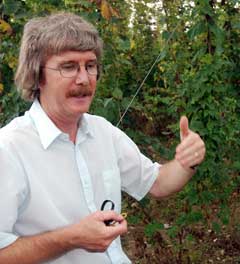 Mark Dredge has an excellent post on a couple of English hop varieties that were once rejected — so officially, I guess, they never became varieties — that now may get fully developed.
Mark Dredge has an excellent post on a couple of English hop varieties that were once rejected — so officially, I guess, they never became varieties — that now may get fully developed.
They’ve got numbers, GP 75 and OZ97a, and who doesn’t feel special brewing with hops before they have names? (Citra was so cool it had two numbers, X-114 and HBC 394, before it became a named hop.) This is potentially good news for English hop growers, who can use all the good news they can get.
There’s a sense among brewers that there’s something different about growing conditions in the Yakima Valley and the southern Hemisphere that makes hops from there more vibrant. That’s not so good for hop growers in England, or in Oregon, for that matter. Maybe not for Germans either, although the Society for Hop Research in Germany recently came up with varieties that seem to have the bold aromas and flavors brewers want. We’ll see how those are doing later this year.
We’ll also see if OZ97a can really deliver “apricot, pineapple, lychee, grapefruit, melon and tangerine.” The photo at the outset is of Peter Darby of Wye Hops in Kent, who is at the center of English hop research. “There’s a lot good already out there. It needs to be rediscovered, almost,” he said in 2011, and he was already at work on it then.
Again, the link for more from Darby.
I’m working on a post on Keyworth’s hops, I’ll be sure to include their numbers!
“There’s a sense among brewers that there’s something different about growing conditions in the Yakima Valley and the southern Hemisphere that makes hops from there more vibrant.”
I believe this is one of those fashion things. It wasn’t so long ago that “vibrant” would have been a dirty word. Fashions change, and I expect the lust for vibrancy will evolve over time. There are still hordes of people who prize German and English hops (and Oregonian!), even if they’re not driving the new releases of single-hop IPAs. At a certain point, your triple IPA that tastes of sweat and onions gets a mite TOO vibrant.
I agree that some of it is fashion. And I certainly hope that Hersbrucker, Tettnang Tettnanger, Fuggle (grown in the UK) get the love they deserve.
However, we are talking about widening the spectrum, so why shouldn’t “vibrant” last as long as “fine”?